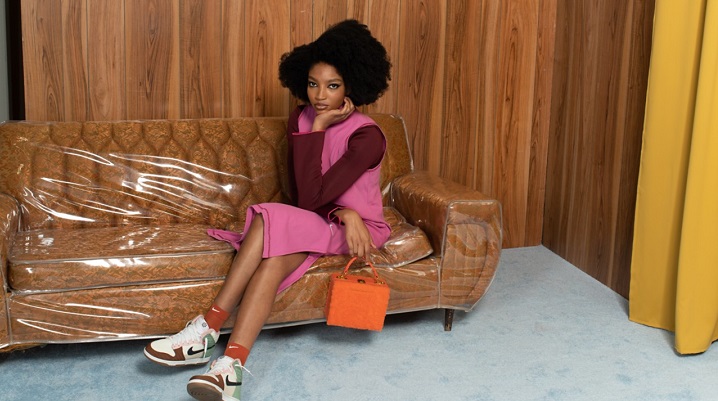US department store Nordstrom has teamed up with Instagram page-turned-online marketplace Black Owned Everything to spotlight four up-and-coming Black-owned fashion and accessories brands alongside global sneaker giants Nike and Jordan as part of its Nordstrom x Nike initiative. The collection was curated and styled by Zerina Akers, a celebrity stylist and the founder of Black Owned Everything, and will be available online and in Nordstrom x Nike shops across the US. It includes women’s
�s clothing brands William Okpo and Sammy B, luxury handbag brand Brand Blackwood and jewellery and accessories brand L’Enchanteur.
Akers called the collection a “fun mix of fashion and lifestyle pieces for the people who are keen on street trends and enjoy functionality”. But more importantly, she said it is a “step in the right direction for the American marketplace and beyond”.
“When we launched Black-Owned Everything back in February of this year, partnerships like Nordstrom x Nike were exactly the type of activations I had in mind to amplify the reach of the Black designers whom I work with and mentor,” Akers said in a statement about the partnership last week.
“This intersection of well-established brands and emerging designers is where the progress of Black Owned Everything’s mission takes place.”
Major retailers step up
Akers’ push to amplify Black-owned brands comes as some US retailers attempt to address racial inequality through their buying, marketing and hiring practices. In the wake of last year’s Black Lives Matter protests, several major retailers, including Nordstrom, Target and Walmart, have committed to stocking more diverse brands.
Nordstrom has set a goal to achieve US$500 million in retail sales from brands owned by, operated by, or designed by Black or Latinx individuals and to increase the representation of Black and Latinx populations in people manager roles by at least 50 per cent by 2025.
Target has pledged to spend more than US$2 billion with Black-owned businesses by the end of 2025, add products from more than 500 Black-owned businesses and engage more Black-owned companies to enhance its retail operations and shopping experience. It also plans to introduce new resources to help its Black-owned vendors grow and successfully scale their businesses in mass retail.
Meanwhile, Walmart has stated that it has a network of more than 2,800 diverse suppliers and continues to look for new suppliers with industry expertise and a desire to deliver quality products and services at scale to its customers.
Other major retailers, such as Sephora, Macy’s, Gap, J.Crew and Crate & Barrel, have signed a pledge to commit 15 per cent of their shelf space to Black-owned brands. The so-called Fifteen Percent Pledge was started by Aurora James, the founder and creative director of luxury shoe and handbag brand Brother Vellies, after the murder of George Floyd in 2020. (Black people make up an estimated 15 per cent of the US population.)
How quotas can help
Rosanna Iacono, a retail expert with over 25 years’ experience, says these types of commitments are a new way of doing things in the industry.
“Retailers in some ways are aligning with procurement policies being driven by governments and large multinationals with strong social impact policies, where they are setting quotas for the percentage of goods or services that should be acquired from SMEs, for example, or from Indigenous-owned businesses,” Iacono, managing partner of The Growth Activists, told Inside Retail.
While some might argue that buying decisions should be driven by consumer demand, not quotas, Iacono believes they encourage buyers to discover new and exciting brands, rather than going back to the same established ones.
“Retailers definitely need to ensure that what they are selecting is commercial and desirable by their customers, but the idea of setting quotas is about pushing buyers to explore beyond what is easy and expected, which would be just selecting from established majors,” she said.
Quotas can also help ensure retailers are making permanent changes to their business, rather than just reacting to the moment with one-off collaborations.
“Their opportunity is to build procurement policies that ensure that it is not just one-off virtue signalling, but a continuous practice to continue to commit to supporting emerging talent, particularly from creators from minority groups,” she said.
And she believes they should be used to support other often overlooked groups, such as local manufacturers.
“Other areas they should consider creating targets for are the percentage of products sourced from local community-owned businesses, which support economic development and job creation in local communities, and in particular from communities facing disadvantage.”

